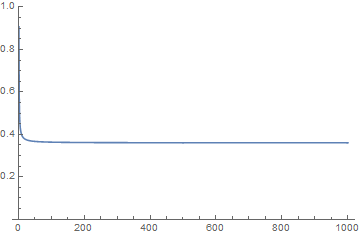Consider the following series:
$$\sigma (\text{x$\_$})\text{:=}\sqrt{\sum _{k=0}^{x-1} \frac{(x! x!) (-1)^{x-k}}{(x-k) (k! (2 x-k)!)}+\frac{\pi ^2}{12}}$$
From the following codes, it seems that the series tends to $0$ with a very low slope as $n$ approaches $+\infty$, this is the case in the article that I'm studying
σ[x_]:=Sqrt[Pi^2/12+Sum[(x!*x!)/(k!*(2 x-k)!)*(-1)^(x-k)/(x-k),{k,0,x-1}]]
Y=Table[σ[n],{n,0,1000}]//N;
ListLinePlot[Y,PlotRange->{0,1}]
but when I compute this limit, there are the results:
Limit[σ[n],n->Infinity]
(*Limit[Sqrt[π^2/12+(-1)^(2+2 n) (HarmonicNumber[n]-HarmonicNumber[2 n])],n->∞]*)
Limit[σ[n],n->Infinity]//N
(*Sqrt[0.822467 -0.693147 2.71828^((0. +2. I) Interval[{-6.67522*10^-308,3.14159}])]*)
Limit[σ[n],n->Infinity]//N//FullSimplify
(*Sqrt[(0. -0.693147 I) Interval[{-1,1}]+Interval[{0.12932,1.51561}]]*)
How can I obtain $0$ as the result of this limit?


